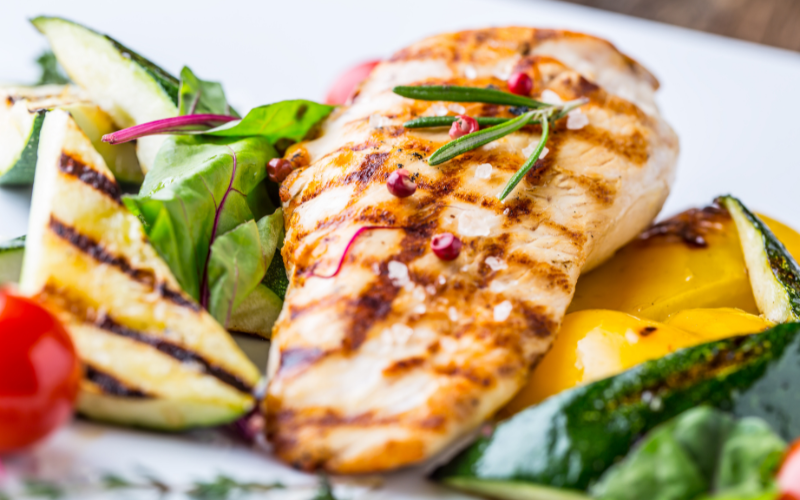
As our loved one’s age, we naturally become more attentive about their well-being, especially regarding their health and nutrition. With the passing years, their body undergoes significant changes, sometimes resulting in restlessness, weakness, health issues, memory issues, and overall decline in health. One big reason for this might be not eating the right kinds of food. Have you noticed your elderly loved one seeming tired or vulnerable? Are you concerned about what they’re eating and if it’s helping them stay healthy? If these worries resonate with you, you are not alone.
Planning meals specifically for seniors becomes important to make sure they eat the right things, like essential nutrients, vitamins, and minerals that are required for a healthy and happy life. In this blog, we’ll learn about effective ways to plan meals, understand the crucial nutrients your older adult needs, and gather some creative meal ideas. Furthermore, we’ll touch upon the significant role of caregivers when it comes to helping prepare meals.
What Nutrition is Necessary for Seniors and Why?
Seniors often experience deficiencies in certain nutrients which lead to various problems such as osteoporosis, heart disease, cancer, and depression. Let’s look at some of the common nutritional deficiencies in the seniors:
- Vitamin B12:
Vitamin B12 is essential for maintaining healthy nerve function and preventing anemia. Since the ability to absorb B12 diminishes with the increase in age, elderly people should prefer eating fortified cereals, meat, fish, or take B12 supplements.
- Omega-3 Fatty Acids:
Omega-3 fatty acids are known to maintain brain and heart health. Seniors can obtain them by eating fatty fish, flaxseeds, walnuts, and chia seeds.
- Fiber:
Fiber helps with digestion and prevents constipation, which is a common issue among seniors. To obtain a perfect amount of fiber, encourage your senior loved ones to eat whole grains, fruits, vegetables, and legumes.
- Calcium and Vitamin D:
Calcium and vitamin D are necessary for bone health and can help prevent osteoporosis in elderly people. We recommend seniors to consume dairy products, leafy greens, and fortified foods that are excellent sources of calcium, while sunlight and fortified foods provide vitamin D.
- Potassium:
Potassium is crucial for heart health and maintaining proper blood pressure. Provide foods like bananas, oranges, potatoes, and spinach that are rich in potassium to your senior loved ones.
- Protein:
Adequate protein intake is essential for preserving muscle mass and strength in seniors. Sources of protein include lean meats, poultry, fish, eggs, dairy, legumes, and nuts which are highly recommended for older adults.
8 Meal Planning Tips For Older Adults
Creating a well-rounded and nutritious meal plan for seniors involves careful consideration of their dietary needs and preferences. We have recommended some necessary meal planning tips that can be beneficial during senior care, such as:
- Consult a Healthcare Professional: Before designing a meal plan, consult a healthcare professional or a registered nutritionist who can provide personalized recommendations based on the senior’s health conditions, dietary restrictions, and nutritional requirements.
- Focus on Balanced Meals: Incorporate a variety of foods from all food groups, including fruits, vegetables, whole grains, lean proteins, and low-fat dairy. Try to aim for colorful meals to ensure a wide range of vitamins and minerals. To note: You can keep the proportion size lower, but make sure that your loved one gets to eat everything.
- Choose Nutrient-Dense Foods: Select foods that provide a high concentration of essential nutrients per serving, such as leafy greens, berries, nuts, and seeds. Nutrient-dense foods help meet nutritional needs without excessive caloric intake.
- Plan Weekly Menus: Devote a dedicated time each week to plan their menus that include a variety of dishes and ingredients. Planning ahead can help ensure a balanced diet and streamline grocery shopping and meal preparation in advance.
- Consider Dementia Care Needs: For seniors with dementia, meal planning should be simple and easy to follow. Provide familiar and favorite foods to encourage eating. Ensure the meals are visually appealing and use contrasting plates to help with food recognition. You could also try some finger foods with them, as it can lead to an increased sense of independence among them.
- Include Easy-to-Prepare Options: Opt for easy-to-make meals, especially if there is overnight care or a home caregiver involved. Casseroles, slow-cooker dishes, and one-pot meals can save time and effort while providing wholesome nutrition.
- Encourage Hydration: Seniors often have reduced thirst perception, making dehydration a concern. Include hydrating foods like fruits, vegetables, soups, green, and herbal teas in the meal plan.
- Involve the Senior in Planning: Whenever possible, involve your senior loved one in the meal planning process. Ask for their preferences and incorporate their favorite foods into the plan, fostering a sense of recognition and enjoyment.
Sample Meal Ideas for Senior’s Health
We have some meal ideas or recommendations that will help you plan an effective meal for your senior loved ones.
For Breakfast
- Start your elderly loved one’s day with nutrient-rich whole grain cereal or oatmeal adorned with a medley of fresh, antioxidant-packed berries and nuts.
- Secondly, you can have a bowl of yogurt paired with sliced banana, topped off with honey for natural sweetness.
- You can opt for whole grain toast accompanied by avocado and poached eggs, giving them a protein-rich meal in the beginning.
- With any of the above breakfast options, you can also add a glass of milk or orange juice that will provide enough calcium and vitamin D.
For Lunch:
- During daytime, choose a delicious lunch bowl filled with grilled salmon, steamed veggies, and quinoa, a perfect blend of protein, healthy fats, and fiber.
- Make a chickpea salad with a variety of mixed greens, tomatoes, and vinaigrette.
- You can also make a wrap, made of turkey and avocado.
- If your senior loved one has dental issues, then you can opt for a comforting lunch with a bowl of vegetable soup paired with some small bit size chewable meat, providing essential vitamins, minerals, and protein.
For Dinner:
- You can choose a lighter dinner, such as lentil soup made with lentils, vegetables, and a light broth. You can add chicken to make it more filling.
- Opt for finger foods such as baked salmon bites, veggie sticks, spinach, and cheese balls, baked sweet potato etc.
By following the above meal planning tips and incorporating a nutritious diet, you can help maintain your elderly loved one’s health, manage chronic conditions, and improve their overall well-being. Moreover, involving a dedicated caregiver is necessary. A caregiver plays a pivotal role in guiding and aiding seniors through their meal plans, ensuring they receive the appropriate nutrition tailored to their specific needs.
Especially for seniors with dementia, caregivers provide invaluable assistance, guaranteeing a meal setup that is comforting, and easy to navigate. At Assisting Hands, we understand the challenges of an older adult. If you’re seeking home caregiver services to support your elderly loved ones, don’t hesitate to reach out. Call us at (214) 760-6944 for more about our daytime care, overnight care, or 24×7 care. We serve seniors in Coppell, TX | Dallas, TX | Highland Park, TX | Richardson, TX | University Park, TX, and the surrounding areas.







